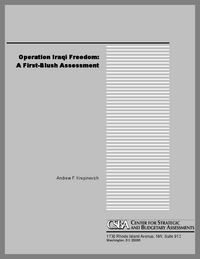
This paper offers a first-blush assessment of the coalition campaign against Saddam Hussein’s regime that began on March 19, 2003, and was declared completed by President George W. Bush on May 1, 2003. Given the lack of comprehensive data on coalition operations and the tentative nature of much of the data thus far made public, many of the “lessons” or implications that follow must be regarded as preliminary. A thorough independent assessment of the conflict is needed, similar to the Gulf War Air Power Survey commissioned by the US Air Force after Operation Desert Storm. Moreover, any assessment of Operation Iraqi Freedom should focus on how the experience of this war will influence future military competitions. The following are among the war’s potential implications for US military planners:
STRATEGIC IMPLICATIONSThe United States Is in the Regime-Change Business
If there ever was any doubt that the United States is in the regime-change business, the Second Gulf War should dispel it. Since the fall of the Berlin Wall, the United States has, directly or indirectly, deposed the regime of a foreign state roughly once every three years. But those who practice regime change incur certain responsibilities as well as moral and political consequences. The United States must stabilize Iraq, lest it incur a significant setback in its efforts to make progress in the war against hostile Islamic regimes and radical Islamic terrorist movements. Success, however, will likely involve a protracted occupation of Islamic states (i.e., Afghanistan and Iraq) and exact substantial human and material costs. This means the US military’s preference to do what it does best—defeat enemy forces in the field and then quickly depart— must be overcome. The practice of crafting quick exit strategies must yield to a willingness to develop a comprehensive strategy for winning both the war and the post-conflict period that follows. In short, the American military—the Army, in particular—must create a significant capability for conducting stability operations.
Divergence, Not Convergence
Although it comes as no surprise to most military observers, Operation Iraqi Freedom again demonstrated the wide—and expanding—gap between the US and all the world’s other militaries in conventional operations. The implications for those who consider themselves actual or potential enemies of the United States are clear: they must avoid taking on the American military in conventional war. Rather, they must move to the extremes along the spectrum of conflict. For rogue states such as Iran and North Korea, this means acquiring nuclear weapons or pursuing more ambiguous forms of aggression through support of terrorist organizations. A third option is to develop anti-access and area-denial capabilities.
The Anti-Access Challenge Is Real and Growing
Operation Iraqi Freedom provided a clear lesson for what has been a growing trend: denying US access to overseas bases. Moreover, the Bush Administration’s increased emphasis on preventive strike and preventive war could make it even more difficult to secure forward base access.
Foreign governments would be more likely to grant access in response to an act of aggression than when the United States is contemplating initiating military operations. This fact highlights the need for the United States to develop and field military forces capable of conducting large-scale power-projection operations independent of access to forward bases.



























